

Babisme. Bāb (prophète) Un article de Wikipédia, l'encyclopédie libre.
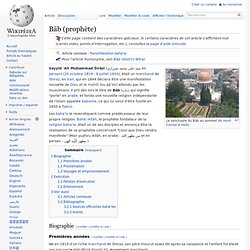
Babisme. Un article de Wikipédia, l'encyclopédie libre.
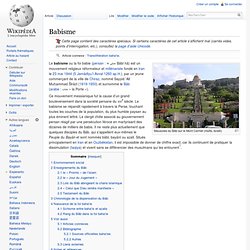
Bahá'u'lláh. Bahá'u'lláh (/bɑːhɑːˈʊlə/; Arabic: بهاء الله, "Glory of God"; 12 November 1817 – 29 May 1892), born Mírzá Ḥusayn-`Alí Núrí (Persian: میرزا حسینعلی نوری), was the founder of the Bahá'í Faith.
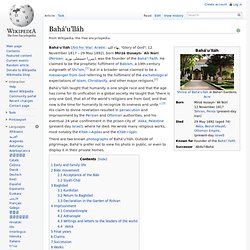
He claimed to be the prophetic fulfilment of Bábism, a 19th-century outgrowth of Shí‘ism,[1] but in a broader sense claimed to be a messenger from God referring to the fulfilment of the eschatological expectations of Islam, Christianity, and other major religions.[2] Bahá'u'lláh taught that humanity is one single race and that the age has come for its unification in a global society. He taught that "there is only one God, that all of the world’s religions are from God, and that now is the time for humanity to recognize its oneness and unite.
" [3] His claim to divine revelation resulted in persecution and imprisonment by the Persian and Ottoman authorities, and his eventual 24-year confinement in the prison city of `Akka, Palestine (present-day Israel), where he died. Early and family life[edit] Mirza Husayn Ali Nuri. Syncretism. Syncretism /ˈsɪŋkrətɪzəm/ is the combining of different, often seemingly contradictory beliefs, while melding practices of various schools of thought.
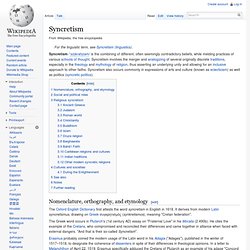
Syncretism involves the merger and analogizing of several originally discrete traditions, especially in the theology and mythology of religion, thus asserting an underlying unity and allowing for an inclusive approach to other faiths. Syncretism also occurs commonly in expressions of arts and culture (known as eclecticism) as well as politics (syncretic politics). Nomenclature, orthography, and etymology[edit] The Oxford English Dictionary first attests the word syncretism in English in 1618.
Bienheureux les simples d'esprit... Il aura donc fallu que la haine qui se rassemblait depuis quelques temps en Avignon se manifeste sous une forme irréparable pour que quelques voix commencent à s'élever contre elle. On apprenait hier, quelques heures après que j'ai terminé un billet désormais obsolète sur cette question, que . Mais au-delà de la haine qu'expriment ces extrémistes, c'est bien à la place de l'art que nous devrions réfléchir : car il ne s'est pas trouvé grand monde pour défendre cette fameuse photo. Marriage. Obeah and Myal. Obeah and Myal Home Introduction Obeah is perhaps the oldest of all Afro-Creole religions in the Caribbean.
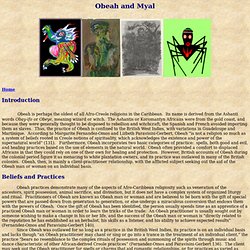
THE WORD OBEAH: What Does It Mean, How Does It Work? "Obeah, on the other hand, is NOT a religion in the classical sense.
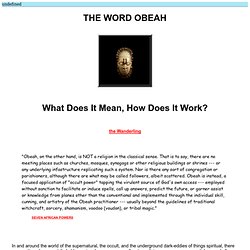
OBEAH: Afro-Caribbean Shamanism. Obeah, as practiced in Jamaica and the Caribbean, takes the USE OF and KNOWLEDGE OF ancient occult powers orginally handed down over the centuries by word of mouth from the remnants of a once very powerful and celebrated SECRET religious Order emanating from a remote age that has long since been lost in the mist of time.
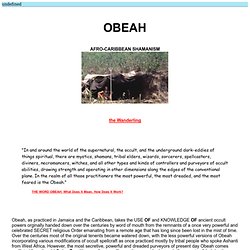
Over the centuries most of the original tenents became watered down, with the less powerful versions of Obeah incorporating various modifications of occult spellcraft as once practiced mostly by tribal people who spoke Ashanti from West Africa. However, the most secretive, powerful and dreaded purveyors of present day Obeah comes undiluted from the old Order. Practitioners of same will sometimes use the less volatile aspects of their brethren, but usually operate well beyond the confines of any traditional witchcraft, sorcery, shamanism, voodoo (voudon), or tribal magic.
Obeah: The Ultimate Resistance. The practice of harnessing supernatural forces and spirits for one’s own personal use, known in some parts of Africa as ‘Obeye’ (an entity that lives within witches), has taken on many names in the Caribbean islands, such as Shango (Trinidad), Santeria (Cuba), Vodun or Voodoo (Haiti), Ju-Ju (Bahamas), Obeah (Jamaica),.
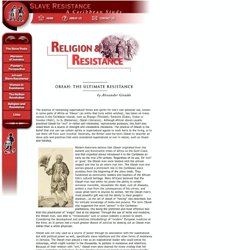
Although African slaves usually practiced Obeah for "evil" or rather self-interested, instrumental purposes, this faith also aided them as a source of strength and clandestine resistance. The practice of Obeah is the belief that one can use certain spirits or supernatural agents to work harm to the living, or to call them off from such mischief.
Generally, the British used the term Obeah to describe all slave acts and practices that were considered supernatural or evil in nature, such as rituals and fetishes. Obeah men played a central role in the conception and development of any serious attempt at rebellion. Orisha. UNESCO News: Wole Soyinka. 16463-wole-soyinka-yoruba-religion. RELIGION AGAINST HUMANITY - W.Soyinka. Yoruba religion. The Yorùbá religion comprises the traditional religious and spiritual concepts and practices of the Yorùbá people.
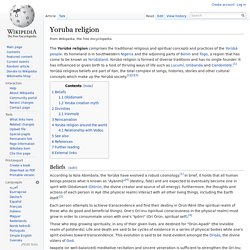
Its homeland is in Southwestern Nigeria and the adjoining parts of Benin and Togo, a region that has come to be known as Yorùbáland. Yorùbá religion is formed of diverse traditions and has no single founder. It has influenced or given birth to a host of thriving ways of life such as Lucumí, Umbanda and Candomblé.[1] Yorùbá religious beliefs are part of Itan, the total complex of songs, histories, stories and other cultural concepts which make up the Yorùbá society.[1][2][3] Beliefs[edit] Egungun. In the broadest sense of the word, Egungun refers to all types of Yoruba masquerades or masked, costumed figure.[1] This same word, however, when used in its more specific, common sense, refers to the Yoruba masquerades connected with ancestor worship.
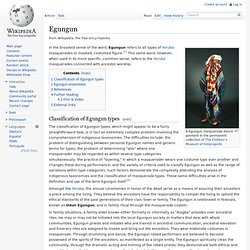
Antisémitisme. Martha Nussbaum, 'The New Religious Intolerance' Interview with Martha Nussbaum: The New Religious Intolerance by David V. Johnson In her new book, The New Religious Intolerance: Overcoming the Politics of Fear in an Anxious Age, Martha Nussbaum extends her distinguished body of work on liberalism, education, literature, and the emotions by turning to the growing anti-Muslim agitations in Europe and the United States. She spoke to Web Editor David V. Islamophobie. L'Islam & les femmes. Alcohol in Islam. Question: Why is alcohol forbidden in Islam? Answer: Intoxicants were forbidden in the Qur'an through several separate verses revealed at different times over a period of years.
At first, it was forbidden for Muslims to attend to prayers while intoxicated (4:43). Then a later verse was revealed which said that alcohol contains some good and some evil, but the evil is greater than the good (2:219). Grande-Bretagne: des musulmans aident les juifs à sauver une synagogue. Grande-Bretagne: des musulmans aident les juifs à sauver une synagogue. Des juifs prient dans une mosquée. Dans le Bronx à New York, chaque vendredi soir pour le service du Shabat, des juifs du quartier se rendent à leur synagogue. Petit détail, la synagogue se trouve au sein même d’une mosquée. La communauté musulmane a mis à la disposition des juifs une partie de la mosquée qu’ils s’utilisent comme synagogue. Cette entraide est le fruit d’une relation ancienne de plusieurs années. La communauté juive, qui possédait une synagogue sur Virginia Avenue, collectait des vêtements pour les familles nécessiteuses dont une partie allait au Cheikh Moussa Drammeh et sa communauté musulmane.
La tomate, ennemie des salafistes. L’erreur des musulmans de Trappes. Cri de colère de la militante palestinienne Ahlam Akram : dans les Yvelines, comme partout ailleurs en Europe, la loi s’applique à tous, y compris à la communauté musulmane, ce que certains de ses membres ont du mal à comprendre. Lorsque la police française a voulu contrôler l’épouse d’un Français d’origine arabe [il s’agirait en réalité d’un Français converti à l’islam] qui portait le voile intégral, le sang de ce dernier n’a fait qu’un tour. Selon lui, la police violait ainsi les libertés individuelles. Lui, par contre, n’avait que faire de la loi française, qui interdit le port du voile intégral depuis le printemps 2011. Ce voile suscite la peur chez d’autres citoyens. Why I Am Not a Christian. Why I Am Not a Christian is a 1927 essay by the British philosopher Bertrand Russell hailed by The Independent as "devastating in its use of cold logic",[1][citation needed] and listed in the New York Public Library's list of the most influential books of the 20th century.[2] History[edit] Originally a talk given March 6, 1927 at Battersea Town Hall, under the auspices of the South London Branch of the National Secular Society, it was published that year as a pamphlet and was later published, with other essays, in the book, Why I Am Not a Christian: And Other Essays on Religion and Related Subjects (ISBN 0-671-20323-1).
Contents[edit] Why I Am Not a Muslim. Why I Am Not a Muslim, a book written by Ibn Warraq, is a critique of Islam and the Qur'an. It was first published by Prometheus Books in the United States in 1995. The title of the book is a homage to Bertrand Russell's essay, Why I Am Not a Christian, in which Russell criticizes the religion in which he was raised.
After removing a modern road, archaeologists have uncovered traces of an ancient road that may have once led Neolithic people in processions up to Stonehenge. Editor's Note: This story was updated Sept. 11 at 9:55 a.m. ET Scientists have uncovered a portion of an ancient path that may have led to Stonehenge. While dismantling a modern road that runs near Stonehenge, the archaeologists uncovered two ditches found to be remnants of an ancient pathway called the avenue. Archaeologists have known of the avenue and suspected it led directly to the monument, but the modern road had cut the delicate pathway in two, obscuring its purpose. The new discovery confirms the avenue's role as an ancient pathway to the site. Major Religions Ranked by Size. Proselytism. Proselytism /ˈprɒsəlɨˌtɪzəm/[1][2] is the act of attempting to convert people to another religion or opinion.
The word proselytize is derived ultimately from the Greek language prefix προσ- (toward) and the verb ἔρχομαι (to come) in the form of προσήλυτος (a new comer).[3] Historically in the Koine Greek Septuagint and New Testament, the word proselyte denoted a gentile who was considering conversion to Judaism. Though the word proselytism originally referred to Early Christianity (and earlier Gentiles such as God-fearers), it now refers to the attempt of any religion or religious individuals to convert people to their beliefs, or any attempt to convert people to a different point of view, religious or not. Proselytism is illegal in some countries.[4] Bahá'í Faith[edit] Christianity[edit] Religion is like a penis. Religion keeping you from being a horrible person. C'est la Bible qui le dit !
Femmes & religions. Mythology. Spirituality. Mouvement rastafari. Un article de Wikipédia, l'encyclopédie libre. Le mouvement rastafari (ou « rasta »[1]) est un mouvement de pensée messianique originaire des Caraïbes. Son nom vient du ras Tafari Mekonnen (de l'amharique ras qui signifie tête mais désigne aussi un haut responsable politique), qui est couronné en 1930 negus d'Éthiopie, roi des rois, lion conquérant de la tribu de Juda, sous le nom d'Haïlé Sélassié. Le mouvement rastafari est assimilé par certains[Qui ?]